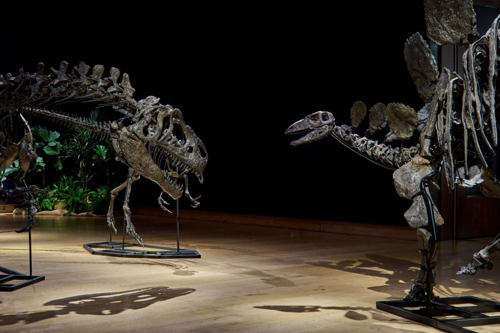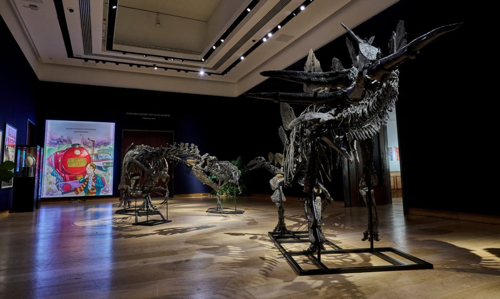
The UK seizes US$15 million in dinosaur bones from Chinese money-laundering suspect Su Binghai
12/11/2025
Su Binghai, is a money launderer with an imagination
- He bought nine apartments in London, spending about $21 million just a week after he evaded police in Singapore.
- He abandoned a collection of supercars in Singapore,
- His assets seized by Britain’s National Crime Agency (NCA) included “dinosaur remains, between 145 million and 157 million years old… of a mother and baby Allosaurus, as well as a Stegosaurus.”
The Chinese businessman was previously wanted for involvement in Singapore’s most significant money-laundering case but has since struck a deal.

British police have seized more than £12 million (US$15.6 million) of dinosaur skeletons after agreeing to a settlement with a Chinese national suspected of being part of a huge money-laundering scandal.
Su Binghai agreed to forfeit three complete fossilised skeletons, along with nine London apartments, bought for around £15 million, but he will be able to keep 25 per cent of all the sale proceeds, a lawyer for the National Crime Agency said at a court hearing on Tuesday.
Su was previously wanted for involvement in Singapore’s biggest money-laundering case, but an Interpol arrest notice was dropped by the country’s authorities after he and his wife agreed to forfeit their assets to the state in a broader deal involving multiple suspects on the run.
The dinosaur remains, dating to between 145 million and 157 million years ago, include a mother and baby Allosaurus and a Stegosaurus. They were sold by Christie’s International by auction at the Jurassic Icons auction in 2024.
Eleven Chinese artefacts bought from auction house Sotheby’s were also forfeited.

Dinosaur fossils are displayed at the auction house Christie’s in London, Britain. Photo: Christies via Reuters
Su agreed to a “full and final settlement of all claims”, according to a copy of the NCA order. His lawyers declined to comment after the court hearing.
The money-laundering case has rocked Singapore, with two bankers jailed over the scandal.
Singapore authorities have seized cash, real estate, cryptocurrency and other assets totalling about S$3 billion (US$2.3 billion), and sent 10 people of Chinese origin to jail last year for laundering illicit funds from overseas gambling operations and other offences.
The NCA brought the case as a civil recovery investigation. The agency successfully obtained an unexplained wealth order, a civil tool increasingly used by UK police agencies to force people to demonstrate they obtained suspect wealth legitimately.
Among the recovered Chinese works of art, worth some £400,000, were Ming dynasty vases and bronze swords. The dinosaur skeletons are currently being held in a London storehouse, the NCA’s lawyer Andrew Sutcliffe said at the hearing.
Sources
The Team
Meet the team of industry experts behind Comsure
Find out moreLatest News
Keep up to date with the very latest news from Comsure
Find out moreGallery
View our latest imagery from our news and work
Find out moreContact
Think we can help you and your business? Chat to us today
Get In TouchNews Disclaimer
As well as owning and publishing Comsure's copyrighted works, Comsure wishes to use the copyright-protected works of others. To do so, Comsure is applying for exemptions in the UK copyright law. There are certain very specific situations where Comsure is permitted to do so without seeking permission from the owner. These exemptions are in the copyright sections of the Copyright, Designs and Patents Act 1988 (as amended)[www.gov.UK/government/publications/copyright-acts-and-related-laws]. Many situations allow for Comsure to apply for exemptions. These include 1] Non-commercial research and private study, 2] Criticism, review and reporting of current events, 3] the copying of works in any medium as long as the use is to illustrate a point. 4] no posting is for commercial purposes [payment]. (for a full list of exemptions, please read here www.gov.uk/guidance/exceptions-to-copyright]. Concerning the exceptions, Comsure will acknowledge the work of the source author by providing a link to the source material. Comsure claims no ownership of non-Comsure content. The non-Comsure articles posted on the Comsure website are deemed important, relevant, and newsworthy to a Comsure audience (e.g. regulated financial services and professional firms [DNFSBs]). Comsure does not wish to take any credit for the publication, and the publication can be read in full in its original form if you click the articles link that always accompanies the news item. Also, Comsure does not seek any payment for highlighting these important articles. If you want any article removed, Comsure will automatically do so on a reasonable request if you email info@comsuregroup.com.


